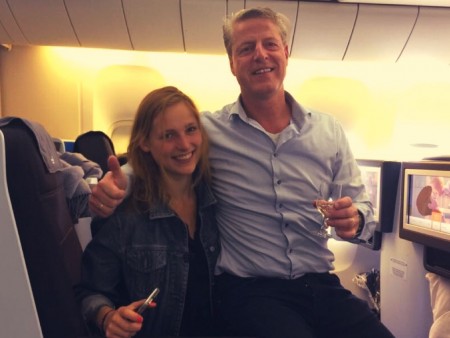 Jo’burg is a city of contraries, inequalities and differences. It is a city known for its violence, but truth is that it is this which allows for peace. Beyond the raging poverty and lack of possessions, even the poorest are rich. Communities in Soweto and Lehae, manage to live in the spirit of Madiba (Mandela) despite their pressing problems. They live for and because of each other.
Jo’burg is a city of contraries, inequalities and differences. It is a city known for its violence, but truth is that it is this which allows for peace. Beyond the raging poverty and lack of possessions, even the poorest are rich. Communities in Soweto and Lehae, manage to live in the spirit of Madiba (Mandela) despite their pressing problems. They live for and because of each other.
This Ubuntu philosophy is the heart of the projects supported by Orange Babies, and drives their success day by day. Visiting two of the Orange Babies projects was beyond amazing, it has shaken me to the core and inspired me to spread the Ubuntu-philosophy as far as I can.
Even though I can’t do anything but encourage to go visit the projects yourself, I will try to describe my experience as vivid as possible. In this post, I will describe (part of) the first day of my Jo'burg experience.
DAY 1
After having arrived last night, me and my dad are ready to our Jo’burg experience. Our day already starts early: at 8.15, Liesbeth is waiting for us downstairs in the lobby of our hotel. She introduces herself and we immediately are part of the Orange Babies world: the enthusiasm with which she talks about the organization, the projects and Jo’burg, makes us even more excited about the days to come.
We began the day with visiting the Lillian Ngoya Clinic, which is supported by HIVSA and Orange Babies. This clinic is used for testing, treating and educating women and their children. These patients can be both HIV-positive or –negative, but are all treated equally and empowered as much as possible. One way this is done is through the I ACT-support groups: groups in which (future) mothers are encouraged to share their stories and make progress towards a happy life.
Liesbeth, Neo,
…, my dad and I had the chance to attend one of these sessions and were amazed by the strength of these women. Many of them were only slightly older than me, but already had an impressive focus on their families and futures.
Because of their situation, they were forced to cope with managing their health, (risk of) disappearing husbands and the issue of feeding their families. Listening to these women, made me realize that HIV is not a simple matter of (sexually transmitted) infection, but a component interwoven in a network of (socioeconomic) problems. It is a matter of culture, education and opportunities, all of which are interconnected.
As a result, solutions are also not as simple. Related issues, like breastfeeding, are approached from many different perspectives. Nevertheless, in case of breastfeeding, the general advice is to consequently feed by breast for at least 6 months. Reasons for this, are the nutrients available in the mother’s milk, its (relatively low) price and the fact that the babies are exposed to the ARV-medicine that the (HIV-positive) mothers are given.
After having attended the I ACT-support group at the clinic, the wonderful ladies of HIVSA gave us a short tour in the clinic. They showed us the waiting areas, delivery rooms and of course the amazing staff that is making the project happen. Talking some employees, I realized that the impact of the clinic extends far beyond just treating the women and children. Regularly, the extreme gratitude for our support is expressed in the women returning to the clinic as volunteers or employees, or by spreading the knowledge gained in their communities. In this sense, the impact of the project can be compared to the spreading of the virus. However, in this case the result is a growing empowerment of many communities, instead of reinforcing the (socioeconomic) vicious circle.
Liesbeth, my dad and I left the clinic inspired and ready for the next impressive experience. Little did we know that this would happen sooner than we had thought. On our way to the Khaya centre, three young men surprised us with knives and stones, shouting to give our phones. Under threat of knives pointing at his throat, my father and Liesbeth quickly handed over their phones. Pumped with adrenaline, and other stimulants, the men rushed off. After the inevitable trembling and confusion, we decided not to let this incident get to us and continued with our busy program after the necessary calls. Looking back, all of us are very happy with this decision as the warm welcome at the Khaya Centre was the best therapy you could think of.
Wondering what happened next? Please read the next post!